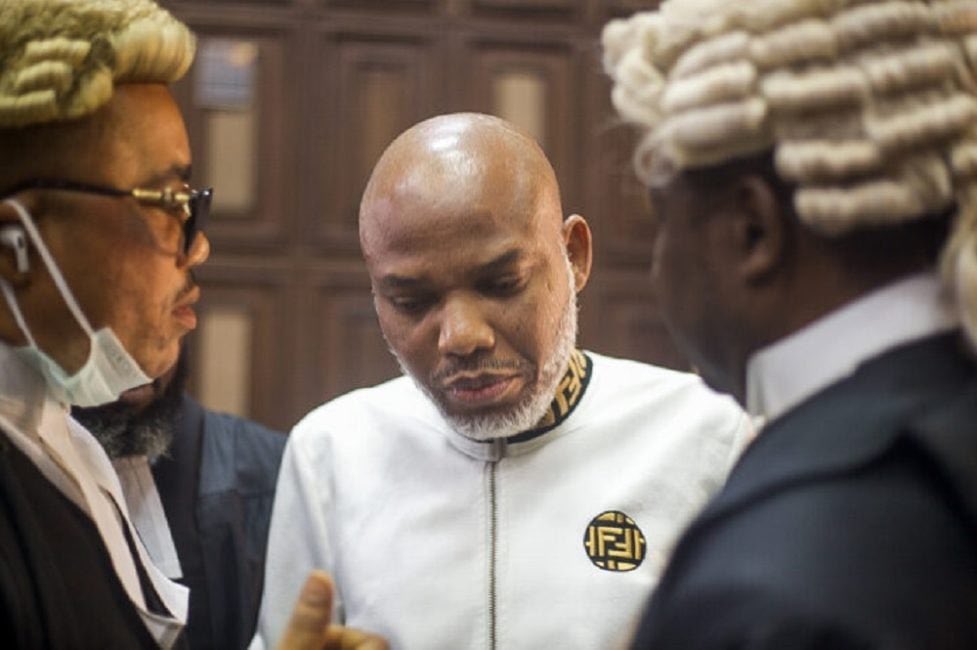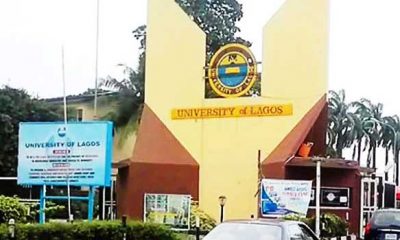

News
Murder Of Super TV CEO: Why We Can’t Take Action Yet On Our Student —UNILAG
Professor Familoni said this was because the university was yet to receive any official report from the appropriate quarters, especially the police, on the allegation levelled against the student.
The University of Lagos (UNILAG), Akoka, has said that it is yet to take any decision against Chidinma Adaora Ojukwu, a 300-level Mass Communication student who, on Thursday, publicly recounted how she stabbed her lover, Super TV CEO, Mr Usifo Ataga, to death some days earlier in the Lekki area of Lagos.
Chidinma, 21, narrated the incident to newsmen while she was being paraded for the crime by the Lagos State police command at its headquarters in Ikeja.
Speaking to Saturday Tribune on Friday on the matter, UNILAG’s Deputy ViceChancellor (Academics and Research), Professor Oluwole Familoni, said although the university received the news with shock, it could not take any instant decision against the student.
Professor Familoni said this was because the university was yet to receive any official report from the appropriate quarters, especially the police, on the allegation levelled against the student.
He said Chidinma committed the alleged crime far away from the university campus and therefore her action was personal and had nothing to do with UNILAG.
According to him, even though the university is not claiming that all its students are saints, it doesn’t teach its students how to murder people or do wrong things.
“So, to us in UNILAG, it is very unfortunate that the girl is not a good ambassador of our university. But then, we can’t disown her because of her alleged action which the school totally condemns,” he said.
He insisted that what Chidinma had done, “as of today” (Friday), was still on the pages of newspapers and other media platforms and the university could not act based on that.
“So, if the university will do anything on the matter, particularly now, it will require official communication from appropriate authorities, particularly the police, to the university,” he stressed.
Professor Familoni pointed out that even at that, one thing is clear and that is, once a student is in police or correctional custody, such a student cannot at the same time be in school let alone register for courses, nor attend lectures nor do any examination.
“So, if they write us that our student has committed a criminal offence of any type, definitely, the law will take its course and that invariably means she will not be able to qualify to remain as our student.
“But as I have said, that could only be when the matter is officially communicated to us,” Professor Familoni emphasised.
News
A Giant Falls: Dr. Pat Asadu Mourns Passing of Senator Okey Ezea

This Is a National Loss: Dr. Pat Asadu Mourns Senator Okey Ezea, ‘A Fearless Defender of Nsukka Land”

Distinguished Senator Okey Ezea, a stalwart champion of Nsukka land, has passed away, leaving a nation in mourning. Dr. Pat Asadu, a close associate, has led the tributes, describing Senator Ezea as a “fearless defender” and “authentic leader” who dedicated his life to serving his people.

Real Full statement;
This was, without a doubt, the most agonising news I received upon my return from a short trip. At first, I doubted it especially because not long before my trip, we had met at a function in Udi LGA. My hesitation also stemmed from the recent, unnecessary, and callous spread of false news about the death of highly placed individuals; too often, such reports turn out to be untrue.
But concern overcame disbelief. In prayerful hope that it was all a hoax, I reached out to some of our leaders and friends, only to have my worst fears painfully confirmed.
I am increasingly worried that many of our great men are dying early in their prime, just as the less privileged also succumb to the harsh realities of life. May the spirit of death hovering over Nigeria for some time now depart from us in Jesus’ name. Amen. Today, we mourn our dear brother, Distinguished Senator Okey Ezea, but not as unbelievers. We are comforted by the knowledge that he fulfilled his purpose.
Senator Okey Ezea, Esq., was Nsukka to the core an authentic leader, a true warrior, and a fearless voice for the marginalized and oppressed within the political spectrum. He fought countless battles for Nsukka land, often using his hard-earned resources and boundless personal energy.
He has indeed run a good race for our people and for humanity. We pray that history will remember Ideke for all his selfless and courageous efforts.
Painfully, just when it seemed he had begun to reap the fruits of his decades-long political struggles and enormous investments as our Senator, God called him home to rest. But beyond the span of time one spends on earth are the legacies one leaves behind and Okey Ezea left us with legacies of courage, truth, and unconditional devotion to justice.
As we mourn this great son of Nsukka, one of the most vocal field marshals of our liberation, we take solace in knowing that his Creator has only invited him home to rest. We dare not question God, for He alone gives and takes life at His appointed time. Yet make no mistake, this passing is a colossal loss in the prime of life of one of our finest leaders.
Nsukka Zone, Enugu State, and Nigeria have lost:
A great Iroko
A fearless warrior
A brutally frank man of affluence
A political Nzeogwu who spoke truth to power
A leader who never shied away from challenging forces bigger than himself
Even when he lost a battle, he would rise swiftly and continue pressing forward to correct the imbalance. Political correctness never swayed him, so long as the cause contributed to the transformation of Nsukka land.
You have fulfilled your part here on earth, Great Ideke.
Our prayers and deepest sympathies are with your family.
Goodnight, Ideke.
Adieu, the great Nzeogwu.
Sleep well, Distinguished Senator of the Federal Republic.
Until we meet again on resurrection morning, our fearless leader.
Rt. Hon. Dr. Pat Asadu & Family
Follow BONA NAIJA for more
News
Nnamdi Kanu moved to Sokoto prison, says lawyer

Nnamdi Kanu, the leader of the Indigenous People of Biafra (IPOB), has been transferred to a correctional facility in Sokoto, Nigeria, following his life sentence for terrorism charges.
His lawyer, Aloy Ejimakor, announced the move on social media, expressing concern about Kanu’s distance from his family and legal team.
Kanu was sentenced to life imprisonment on Thursday by Judge James Omotosho of the Federal High Court in Abuja for counts one, four, five, and six of the seven-count charge. He also received additional prison terms for other charges.
The judge cited Kanu’s violent tendencies and deemed him unsuitable for Kuje prison, ordering that he be placed in protective custody.
The items retrieved from Kanu, including a smuggled transmitter, will be forfeited to the federal government.
Follow BONA NAIJA for more
News
Police, School Owner Dismiss Viral Kidnap Claims in Nasarawa

The Nasarawa State Police Command and the management of St. Peters’ Foundation Secondary School have debunked reports alleging that students were kidnapped from the school premises on Friday.
The false claims, which spread rapidly across social media, suggested that suspected kidnappers invaded the school located in the state.
However, during a voice call facilitated by the Police Public Relations Officer, Ramhel Nansel, and shared with TVC News Digital, the school proprietor, Peters Ezegwoya, dismissed the reports as baseless.
Ezegwoya clarified that the alarm was triggered when students heading to the school field for their Physical and Health Education (PHE) practicals sighted armed local hunters. Their presence led to panic, prompting teachers to escort the students back to their classrooms.
He explained:
“This is a rumor. The students were on the school field for their Physical and Health Education practical when one student raised a false alarm. After teachers sent the students back to their classrooms, they continued spreading the unfounded rumor about a kidnapping on school grounds. It is entirely false.”
The Police Command has urged the public to disregard the misinformation and avoid sharing unverified reports capable of causing unnecessary panic.
Follow BONA NAIJA for more
News
Niger Confirms Fresh School Attack, Blames Management for Ignoring Security Warning

The Niger State Government has confirmed the abduction of students and staff of Saint Mary’s Catholic School in Papiri, Agwara Local Government Area, following a bandit invasion on Friday.
Bandits were reported to have stormed the school between 2am and 3am, whisking away an unverified number of pupils and staff. Earlier, the Head of Department, Disaster and Relief in Agwara LGA, Ahmed Abdullahi Rofia, confirmed the incident by phone but withheld details.
In an official statement, Secretary to the State Government (SSG), Abubakar Usman, said intelligence received earlier had prompted the state to order the closure of all boarding schools in the threatened areas. He noted that the affected Catholic school defied this directive and reopened without notifying the government.
Usman said:
“The Niger State Government has received with deep sadness the disturbing news of the kidnapping of pupils from St. Mary’s School in Agwara Local Government Area. The exact number of abducted pupils is yet to be confirmed as security agencies continue to assess the situation.”
According to him, the government had issued a security advisory after credible intelligence indicated heightened threats across parts of the northern senatorial district.
“In response to these credible security alerts, the State Government had earlier issued a clear directive suspending all construction activities and ordering the temporary closure of all boarding schools within the affected zone as a precautionary measure.
“St. Mary’s School, however, proceeded to reopen and resume academic activities without notifying or seeking clearance from the state.”
He added that security agencies have launched a full-scale investigation and search-and-rescue operation to ensure the safe return of the abducted victims.
“The Niger State Government is in close communication with all relevant security formations and will provide continuous updates as more information becomes available.”
The government urged school proprietors, community leaders, and stakeholders to strictly adhere to security advisories to avoid preventable tragedies, stressing that safeguarding the lives of children remains a top priority.
The latest attack comes as insecurity resurges across some northern states. Recently, the Kwara State Government shut down over 50 schools due to similar security concerns.
Follow BONA NAIJA for more
News
BREAKING: Court Sentences Nnamdi Kanu to Life Imprisonment

Justice James Omotosho of the Federal High Court in Abuja has sentenced Nnamdi Kanu, leader of the proscribed Indigenous People of Biafra (IPOB), to life imprisonment, marking a major climax to a decade-long trial.
The judgment, delivered on Thursday, comes four years after Kanu was arrested in Kenya under controversial circumstances and returned to Nigeria to face terrorism charges.
Kanu was convicted on all seven counts bordering on terrorism, despite pleading not guilty throughout the trial.
The judgment was delivered in his absence after he insisted that the court would not deliver judgment in the case. His refusal to participate prompted Justice Omotosho to order security operatives to remove him from the courtroom over what the judge described as “unruly behaviour.”
In his ruling, Justice Omotosho held that several of Kanu’s broadcasts on Radio Biafra amounted to acts of terrorism, noting that his rhetoric was intentionally violent and targeted at destabilizing the country.
He added that Kanu’s sit-at-home directives in the South-East constituted terrorism, describing the order as a violation of citizens’ constitutional right to freedom of movement.
The court further stated that evidence before it showed Kanu had carried out “preparatory acts of terrorism” through broadcasts in which he allegedly ordered attacks on police and military personnel.
Justice Omotosho concluded that Kanu committed acts of terrorism against the Federal Republic of Nigeria, warranting the sentence imposed.
-

 World News2 weeks ago
World News2 weeks agoUS Military Submits Contingency Plan for Action in Nigeria
-

 World News3 weeks ago
World News3 weeks agoTrump asks Pentagon to immediately start testing U.S. nuclear weapons
-

 Music3 weeks ago
Music3 weeks agoMusic: Badshah and Davido Launch Cross-Cultural Hit “Wallah Wallah”
-

 Entertainment3 weeks ago
Entertainment3 weeks agoBurna Boy Makes Twitch Debut with PlaqueBoyMax in Freestyle Session
-

 Music News2 weeks ago
Music News2 weeks agoBurna Boy, Davido, Ayra Starr, Wizkid Lead Nigeria’s Charge in 2026 Grammy Nominations
-

 News3 weeks ago
News3 weeks agoGround Operation, Air Strikes Could Be Part of US Attack in Nigeria – Trump
-

 Imo State3 weeks ago
Imo State3 weeks agoWidow rescued from drinking water used to bathe husband’s corpse in Imo
-

 News3 weeks ago
News3 weeks agoAsari Dokubo Warns Trump: ‘Nigeria Will Be the Graveyard of Any US Invasion’
-

 Entertainment2 weeks ago
Entertainment2 weeks agoDavido Splashes ₦1.08 Billion on 2025 Rolls-Royce Black Badge Cullinan
-

 Africa4 weeks ago
Africa4 weeks ago12 Feared Dead in Kenya Plane Crash En Route to Maasai Mara

































